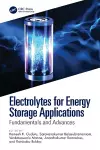
Electrolytes for Energy Storage Applications
5 contributors - Hardback
£135.00 was £150.00
Dr. Ramesh K. Guduru (Ph.D. in Nanomaterials at NC State University) is a faculty at Pandit Deendayal Energy University-India, and founded a startup GreenXcel Technologies that specializes in circular economy with a focus on green energy solutions. Prior to that he was a full-time faculty at Texas State University for five years, and also worked as an adjunct faculty at the University of Michigan, and as a Chief Scientist at CSquared Innovations LLC. Dr Guduru has over 12 years of experience in rechargeable batteries and supercapacitors, and published several articles (110+, 7 book chapters) and holds multiple (4 international patents + 2 Indian patents in pending), and served on review panels for NSF-USA, QNRF-QATAR, Skolkovo Foundation-RUSSIA, and SNF-Switzerland.
Dr Balasubramaniam Saravanakumar working as a Junior Scientist at SARP-LARPM, Central Institute of Petrochemicals Engineering and Technology (CIPET), Bhubaneswar, Odisha, India. He received a doctoral degree from Jeju National University, Jeju, Republic of Korea. His research interest is to develop new materials and fabrication techniques for energy harvesting applications as well as to develop new types of self-powered devices. Similarly, he is working in the field of energy storage devices such as supercapacitors, and batteries in the aspects of and aqueous-based electrolytes. He published > 60 articles in peer-reviewed journals with ~ 3200 citations and an H-index of 28.
Dr Manne Venkateswarlu, Ph.D., is the Director at Customized Energy Solutions India, leading cutting-edge storage technology development for E-Mobility and ESS. His expertise includes solid electrolyte research, advanced batteries, technology licensing, project management, and pilot-scale production. Collaborating closely with research institutions, he optimizes resource utilization to deliver groundbreaking solutions in the energy domain. As a co-author of numerous articles, he significantly contributes to electrochemical and power sources. He received prestigious awards, including Best Research Scientist, Industrial Researcher of the Year, and Leadership in Clean Mobility, for his unwavering dedication to advancing Li-ion battery tech for e-mobility and ESS applications.
Dr Ananthakumar Ramadoss is a Scientist (Jr) at the CIPET: SARP-ARSTPS, Chennai, India. He received his Ph.D. degree in Mechanical Engineering from Jeju National University, South Korea. He was a Scientist (Jr) at LARPM, Bhubaneswar, a Humboldt Postdoctoral Fellow at University of Konstanz, Germany, a Postdoctoral fellow at KAIST, Korea, and a research fellow at CECRI, India. His research interests focus on developing nanostructured materials and their applications in supercapacitors, nanogenerators, self-powered systems, thin films,& corrosion. He has published over 90 research articles, >15 book chapters, and 1 patent. Also, he has received various awards and a prestigious fellowship.
Dr. Rambabu Bobba is a professor of physics at Southern University and A&M College, Baton Rouge (SUBR). He earned his Ph.D. in Physics in 1982 from Indian Institute of Technology-Madras/Chennai. After completing his post-doctoral assignments at University of Minnesota, and at University of New Orleans, he joined as faculty member in the Department of Physics at SUBR in 1986. During his tenure at SUBR, published 125 papers and several extended abstracts and successfully completed visiting professor assignments in AT&T Bell Laboratories, Lawrence Livermore National laboratory, Dow Chemical Company, University of West Indies, US_DOD- Office of Naval Research, and finally as USIEF-Fulbright Fellow in India. His research encompasses the design and development of low cost, more efficient nanoionics materials that can facilitate widespread commercialization of electrochemical energy storage and conversion technologies such as lithium batteries, supercapacitors, fuel cells (HT-PEMFCs and LT-SOFCs), and solar hydrogen to address the world's energy and environmental challenges.